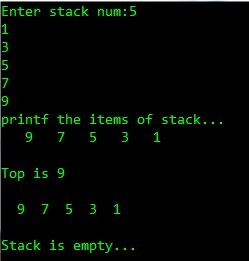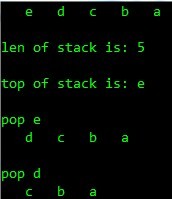各种基本算法实现小结(二)—— 堆 栈
各种基本算法实现小结(二)—— 堆 栈
(均已测试通过)
==============================================================
栈——数组实现
测试环境:VS 2010
1 #include <stdio.h> 2 char stack[512]; 3 int top=0; 4 void push(char c) 5 { 6 stack[top]=c; 7 top++; 8 } 9 char pop() 10 { 11 top--; 12 return stack[top]; 13 } 14 int is_empty() 15 { 16 return 0==top; 17 } 18 void main() 19 { 20 push('1'); 21 push('2'); 22 push('3'); 23 push('4'); 24 push('5'); 25 while(!is_empty()) 26 putchar(pop()); 27 putchar('\n'); 28 }
运行结果:

====================================================
栈——数组实现2
测试环境:VS 2010
1 #include "stdafx.h" 2 #include <malloc.h> 3 #define DataType int 4 #define Max 1024 5 6 typedef struct _stack{ 7 DataType data[Max]; 8 int top; 9 }stack ,*pstack; 10 11 pstack init_stack() 12 { 13 pstack ps; 14 ps=(pstack)malloc(sizeof(stack)); 15 if(!ps) 16 { 17 printf("Error . fail malloc ...\n"); 18 return NULL; 19 } 20 ps->top=-1; 21 return ps; 22 23 } 24 int empty_stack(pstack ps){ 25 if(-1 == ps->top) 26 return 1; 27 else 28 return 0; 29 } 30 int push(pstack ps,DataType data){ 31 if(ps->top==Max-1){ 32 printf("Stack is full...\n"); 33 return 0; 34 } 35 ps->top++; 36 ps->data[ps->top]=data; 37 return 1; 38 } 39 int pop(pstack ps,DataType *data){ 40 if(empty_stack(ps)){ 41 printf("stack is empty...\n"); 42 return 0; 43 } 44 *data = ps->data[ps->top]; 45 ps->top--; 46 return 1; 47 } 48 DataType top_stack(pstack ps){ 49 if(empty_stack(ps)){ 50 printf("stack is empty...\n"); 51 return 0; 52 } 53 return ps->data[ps->top]; 54 } 55 56 void display(pstack ps){ 57 int i; 58 if(empty_stack(ps)) 59 { 60 printf("Stack is empty...\n"); 61 return ; 62 } 63 printf("printf the items of stack...\n"); 64 for(i=ps->top;i>-1;i--){ 65 printf("%4d",ps->data[i]); 66 } 67 printf("\n\n"); 68 } 69 70 int _tmain(int argc, _TCHAR* argv[]) 71 { 72 int i,num,data,*pdata; 73 pstack ps; 74 ps=init_stack(); 75 printf("Enter stack num:"); 76 scanf("%d",&num); 77 for(i=0;i<num;i++){ 78 scanf("%d",&data); 79 push(ps,data); 80 } 81 display(ps); 82 printf("Top is %d\n\n",top_stack(ps));
83 pdata =(int *)malloc(sizeof(int)); 84 for(i=0;i<num;i++){ 85 pop(ps,pdata); 86 printf("%3d",*pdata); 87 } 88 printf("\n\n"); 89 display(ps); 90 }
运行结果:

====================================================
栈——链表实现
测试环境:vs2010
1 #include "stdafx.h" 2 #include <malloc.h> 3 typedef char DataType; 4 struct _node{ 5 DataType data; 6 struct _node *next; 7 }; 8 9 typedef struct _node node,*pstack; 10 pstack init_stack() 11 { 12 pstack ps; 13 ps=(pstack)malloc(sizeof(node)); 14 if(NULL==ps){ 15 printf("Error,malloc is fail...\n"); 16 return NULL; 17 } 18 ps->data=-1; 19 ps->next=NULL; 20 return ps; 21 } 22 pstack push(pstack ps,DataType data){ 23 pstack ptop; 24 ptop=(pstack)malloc(sizeof(node)); 25 if(NULL==ptop){ 26 printf("Error,malloc is fail...\n"); 27 return NULL; 28 } 29 ptop->data=data; 30 ptop->next=ps; 31 ps=ptop; 32 return ps; 33 } 34 35 pstack pop(pstack ps,DataType *data){ 36 if(ps->next==NULL){ 37 printf("stack is empty...\n"); 38 return NULL; 39 } 40 *data=ps->data; 41 ps=ps->next; 42 return ps; 43 } 44 DataType top_stack(pstack ps){ 45 if(NULL==ps->next){ 46 printf("stack is empty...\n"); 47 return -1; 48 } 49 return ps->data; 50 } 51 52 int len_stack(pstack ps){ 53 int len=0; 54 pstack ptop=ps; 55 while(ptop->next){ 56 len++; 57 ptop=ptop->next; 58 } 59 return len; 60 } 61 62 void display(pstack ps){ 63 pstack ptop; 64 ptop=ps; 65 while(ptop->next != NULL){ 66 printf("%4c",ptop->data); 67 ptop=ptop->next; 68 } 69 printf("\n\n"); 70 } 71 72 73 int _tmain(int argc, _TCHAR* argv[]) 74 { 75 pstack ps; 76 DataType *data=(DataType *) malloc(sizeof(DataType)); 77 ps=init_stack(); 78 ps=push(ps,'a'); 79 ps=push(ps,'b'); 80 ps=push(ps,'c'); 81 ps=push(ps,'d'); 82 ps=push(ps,'e'); 83 display(ps); 84 printf("len of stack is :%d\n\n",len_stack(ps)); 85 printf("top of stack is :%c\n\n",top_stack(ps)); 86 ps=pop(ps,data); 87 printf("pop %c \n",*data); 88 display(ps); 89 ps=pop(ps,data); 90 printf("pop %c \n",*data); 91 display(ps); 92 93 }
运行结果:

========================================================
堆 ——链表实现
测试环境:VS 2010
1 #include "stdafx.h" 2 #include <malloc.h> 3 #include <stdlib.h> 4 struct _node{ 5 int data; 6 struct _node *next; 7 }; 8 9 typedef struct _node node,*pnode; 10 11 struct _linkqueue{ 12 pnode front; 13 pnode rear; 14 }; 15 16 typedef struct _linkqueue linkqueue,*plinkqueue; 17 18 linkqueue init_queue(){ 19 linkqueue lq; 20 lq.front=lq.rear=(pnode)malloc(sizeof(node)); 21 if(NULL==lq.front){ 22 printf("Error.malloc is fail...\n"); 23 exit(1); 24 } 25 lq.rear->data=lq.front->data=-1; 26 lq.rear->next=lq.front->next=NULL; 27 return lq; 28 } 29 30 int empty_queue(linkqueue lq){ 31 if(lq.front == lq.rear) 32 return 1; 33 else 34 return 0; 35 } 36 37 linkqueue insert_item(linkqueue lq,int data){ 38 pnode pq; 39 pq=(pnode)malloc(sizeof(node)); 40 if(pq==NULL){ 41 printf("Error .malloc is fail...\n"); 42 exit(1); 43 } 44 pq->data=data; 45 pq->next=lq.rear->next; 46 lq.rear->next=pq; 47 lq.rear=lq.rear->next; 48 return lq; 49 } 50 51 linkqueue delete_item(linkqueue lq,int *data){ 52 if(empty_queue(lq)){ 53 printf("queue is empty...\n"); 54 exit(1); 55 } 56 *data=lq.front->data; 57 lq.front=lq.front->next; 58 return lq; 59 } 60 61 int len_queue(linkqueue lq){ 62 int len=0; 63 while(lq.front){ 64 len++; 65 lq.front=lq.front->next; 66 } 67 return len; 68 } 69 70 void display(linkqueue lq){ 71 linkqueue p; 72 p=lq; 73 if(empty_queue(lq)){ 74 printf("queue is empty...\n"); 75 return ; 76 } 77 while(p.front->next){ 78 printf("%4d",p.front->data); 79 p.front=p.front->next; 80 } 81 printf("%4d\n\n",p.front->data); 82 } 83 84 int _tmain(int argc, _TCHAR* argv[]){ 85 int *data =(int *)malloc(sizeof(int)); 86 linkqueue lq; 87 lq=init_queue(); 88 lq=insert_item(lq,1); 89 lq=insert_item(lq,2); 90 lq=insert_item(lq,3); 91 lq=insert_item(lq,4); 92 lq=insert_item(lq,5); 93 display(lq); 94 printf("len of queue is :%d\n\n",len_queue(lq)); 95 lq=delete_item(lq,data); 96 printf("delete %d\n",*data); 97 display(lq); 98 lq=delete_item(lq,data); 99 printf("delete %d\n",*data); 100 display(lq); 101 102 }
运行结果:

本文来自:~~~




 浙公网安备 33010602011771号
浙公网安备 33010602011771号